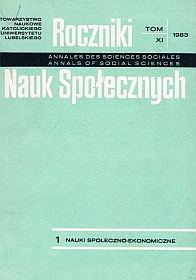Prawo do rozwoju
Abstrakt
The development of the human person should be full i.e. it should add to the development of every man and the whole man. The development is achieved through education, rearing, one’s own work, food, clothing, home and medical care. In the present world there live about one thousand million illiterate people (including the old and children under school age). According to UNICEF's report on 1981—82. 17 million children died of hunger and it is estimated that about haft of all the children living in the Third World countries is underfed and over 300 million is physically or mentally retarded.
Every man has the right to education and modicum of living, however, the universalism of these rights is not parallelled by their universal protection. It is seems to be a hypocrisy that the problem of human rights is being politicalized and the quarrel over human rights between the East and West still continues in the face of a blatant threat to the rights to living and to development. In this situation the humanism of modern industrial societies appears as egoistic and selective.
In the paper the author associates human rights with human needs but does not identify them. The level and range of satisfying the needs are the level and range of the realization of human rights.
The author includes, after K. Vasak, the right to development to the rights of the third generation. In his opinion this right is a synthesis of all human rights. The synthesis expresses the unity of human rights and indivisibility of their realization. All rights have a universal dimension, but when the right to development is considered as a synthesis, not only its universal dimension is emphasized in the sense of its applying to every individual but also the universal dimension of its realization.
The right to development is a solidarity right for „the full development of man must go together with the development of the whole mankind in solidarity” (Pope Paul VI). This is a dynamic right since it obliges individuals, national minorities, nations, countries and the whole public in the world to act for the benefit of human development and demands changes of unjust socio-economic structures. The objects of the right to development are individual persons, states, national minorities, nations, and the whole mankind. The author treats this right as a human right when he considers an individual person as an object of the right; when other objects are considered, the right is treated as a collective one. The author disagrees with these who consider the right to development as a collective right only.
Copyright (c) 1983 Roczniki Nauk Społecznych

Utwór dostępny jest na licencji Creative Commons Uznanie autorstwa – Użycie niekomercyjne – Bez utworów zależnych 4.0 Międzynarodowe.


